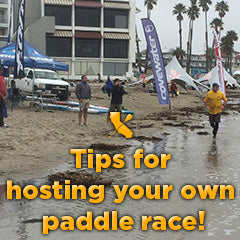 For anyone out there who has a desire to get yelled out, make people unhappy, and for at least a brief moment, feel like a failure, then you should definitely plan your first paddleboard race. In all fairness it is also one of the more rewarding endeavors I have ever undertaken, but the first sentence still holds true. The first race I ever planned was the inaugural Stand up to Alzheimer’s race in San Diego. There were some who came off the long course visibly upset because they felt the course was not marked well enough. They didn’t yell at me directly, but it still felt like it. The food trucks that were made to leave only halfway through lunch due to us inadvertently short-cutting our permitting were certainly a little unhappy, and because of those two events, and probably the police informing me and my co event planner that we did not have the correct permit certainly made me feel like I was far from a successful race director.
For anyone out there who has a desire to get yelled out, make people unhappy, and for at least a brief moment, feel like a failure, then you should definitely plan your first paddleboard race. In all fairness it is also one of the more rewarding endeavors I have ever undertaken, but the first sentence still holds true. The first race I ever planned was the inaugural Stand up to Alzheimer’s race in San Diego. There were some who came off the long course visibly upset because they felt the course was not marked well enough. They didn’t yell at me directly, but it still felt like it. The food trucks that were made to leave only halfway through lunch due to us inadvertently short-cutting our permitting were certainly a little unhappy, and because of those two events, and probably the police informing me and my co event planner that we did not have the correct permit certainly made me feel like I was far from a successful race director.

At the same time, we also more than doubled our target fundraising goal, largely due to an anonymous beach goer who asked how much money we had raised, at the time it was around a 1000, so he promptly wrote a check for a 1000. Thus we finished the day with around 2300. We brought awareness of various facets of Alzheimer’s and living with Alzheimer’s to a community, even having compliments on our efforts as far away as the United Kingdom via social media. Additionally both my co event planner and I got to do something palpable after we each had family members diagnosed with Alzheimer’s.
If you still want to plan a race, here are 4 steps you should definitely know:
- Plan out your venue over 6 months in advance. Races take place in beautiful locations, which also means that getting a permit will be a laborious process. On the plus side, everyone I have dealt with in regards to permitting has been incredibly positive, that is one of the perks about a philanthropic race. a) Also, read your permit paperwork carefully. You don’t want to miss a requirement for portable restrooms on there and be stuck spending 300+ that you didn’t budget for a few weeks before the event. Trust me as well that telling the parks office that you don’t need restrooms because your race starts with racers waist deep in the water will not go over well.
- There are others out there who disagree with the following, but I have had far more success courting sponsors, which should begin right after permitting for the venue, using slightly less formal, but also personalized emails. A colleague of mine has a generic letter that gets mailed out to hundreds of potential sponsors for a fundraiser to help homeless in our local community, and he will swear to the efficacy of this strategy. I, however, have just seen much greater success with individual emails to sponsors that I think will be receptive to the cause I support. If you have enough of a social media presence a few unexpected sponsors will likely contact you without solicitations on your end.
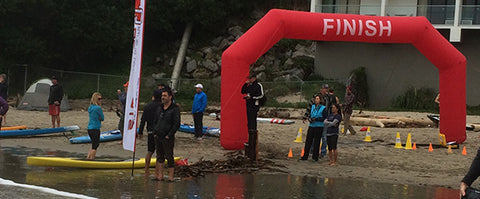 a) I am not sure I can speak to how many sponsors is a good number. Like many of you reading I have been to phenomenal races that had nothing but a box of free donuts and some stoke, and I have been to races where the sponsors were so numerous I would struggle to remember half of them a day later. You do need enough, however, to help offset costs. b)Although it may feel presumptuous, you should have some sort of sponsor contract to send to potential sponsors. This will help prevent people from trying to take advantage of you.
a) I am not sure I can speak to how many sponsors is a good number. Like many of you reading I have been to phenomenal races that had nothing but a box of free donuts and some stoke, and I have been to races where the sponsors were so numerous I would struggle to remember half of them a day later. You do need enough, however, to help offset costs. b)Although it may feel presumptuous, you should have some sort of sponsor contract to send to potential sponsors. This will help prevent people from trying to take advantage of you.
- Set up a website and some social media presences.
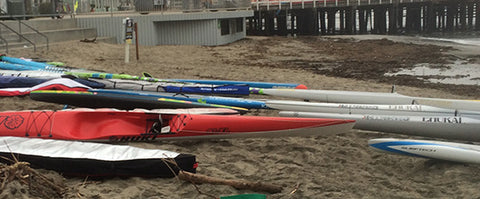 a) There are many website builders out there, and a lot are free as long as you include their name in your web address. Having info on a registration site like paddleguru is really helpful, but not enough. Potential sponsors will want to know more than just what they can find on a registration site. b) Ok, so I cheated when trying to build a base of likes for my own race’s facebook page. As a high school teacher I had 180 students to try to coax into liking my page. Numerous did not have a facebook account. Many informed me that facebook is for old people, but it still helped a lot. The rest of the likes came from having a successful event already and posts that slowly got noticed and expanded our base. It probably is unnecessary to state, but posts with pics easily get the most attention.
a) There are many website builders out there, and a lot are free as long as you include their name in your web address. Having info on a registration site like paddleguru is really helpful, but not enough. Potential sponsors will want to know more than just what they can find on a registration site. b) Ok, so I cheated when trying to build a base of likes for my own race’s facebook page. As a high school teacher I had 180 students to try to coax into liking my page. Numerous did not have a facebook account. Many informed me that facebook is for old people, but it still helped a lot. The rest of the likes came from having a successful event already and posts that slowly got noticed and expanded our base. It probably is unnecessary to state, but posts with pics easily get the most attention.
- Miscellaneous but really important stuff a) Get a race shirt made ahead of time, and go to races in it. Talk up your race at these, but also pay attention to what works well and what doesn’t. What do people love and what do they complain about. b) Do as complete a dry run as you can before race day. Paddle the course, make sure your timing system works, figure out where your photographer will be taking pictures from, practice getting someone to first aid, figure out where your trash cans will go. You’re going to be stressed and exhausted on race day, so the more you can prep ahead the better. c) Smile. You are spreading the same stoke that you have enjoyed many times when others have planned races, even if it’s not completely altruistic, it’s still pretty awesome, and you don’t have to do it again next year, but you probably will.
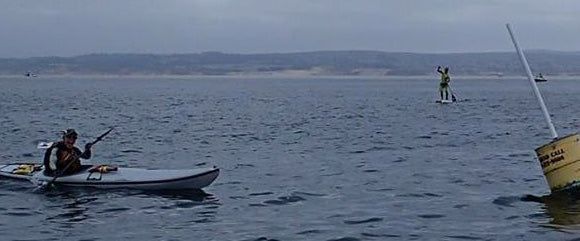
Keep in mind that this is far from everything you have to do, but it will help get you going, feel free to contact me through the Stand up to Alzheimer’s facebook page if you have any extra questions. Or better yet, come to the Stand up to Alzheimer’s race in Monterey on July 9 and ask me then.
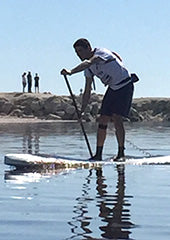 Team Writer Bret Warner - Paddling truly got its hooks into me when I, on a whim, watched the 1999 Santa Cruz Paddlefest with my dad. I had kayaked a little before, but from then on the addiction was palpable. My first kayak, a purple and turquoise Necky Rip, came soon after. The following year I was that kid at UCSD who had a surf kayak in the common study area instead of a surfboard in my dorm room. I also taught sea kayaking all through college in San Diego, and up in Santa Cruz after I graduated.
Team Writer Bret Warner - Paddling truly got its hooks into me when I, on a whim, watched the 1999 Santa Cruz Paddlefest with my dad. I had kayaked a little before, but from then on the addiction was palpable. My first kayak, a purple and turquoise Necky Rip, came soon after. The following year I was that kid at UCSD who had a surf kayak in the common study area instead of a surfboard in my dorm room. I also taught sea kayaking all through college in San Diego, and up in Santa Cruz after I graduated.
When SUP came around, however, the paddling addiction became even more rabid. The garage started to fill up with different types of boards, and is now more than half full of hollow wood boards I have built myself,both for environmental reasons, and because it’s awesome to get to talk about how you built your own board when people ask you about it after a race. I love the paddle racing scene in California right now. Everyone is so stoked to be on the water competing, and the fierce competition is matched by the smiling faces when the race is over. I have gotten to paddle crafts that I never really considered before, and can see myself getting hooked all over again on something else: prone, OC-1, surfski,whatever, I just need more garage space.
Three years ago I founded the non-profit Stand up to Alzheimer’s. An organization that raises money and awareness for Alzheimer’s research through paddle races. This organization was born from lacking a tangible way of dealing with my father’s diagnosis with Alzheimer’s, but has now become a way, hopefully, for other to help cope as well. Our next event is on July 9 in Monterey at Del Monte Beach, just a little north from Monterey Bay Kayaks. Visit us at www.sup2alzh.weebly.com.


















Comments